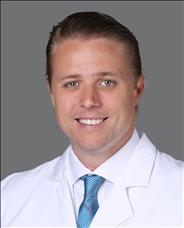Dr. Justin Sporrer | Source | Neurosurgeon and Director of Functional Neurosurgery at Miami Neuroscience In...

Dr. Justin Sporrer
Justin Sporrer, M.D., is a Neurosurgeon and Director of Functional Neurosurgery at Baptist Health’s Miami Neuroscience Institute. He specializes in general neurosurgery, functional neurosurgery, deep brain stimulation and high-intensity focused ultrasound (HiFU) for movement disorders. Dr. Sporrer received his undergraduate degree from Georgetown University, where he received the Barrett Award for Excellence in Humanities, the Department of Physics Award and the Chapman Award in Biology. He received his Medical Degree from the University of Florida, earning numerous accolades, including the Academic Perfection Award and the AMA Educational Research Foundation Award.
-
Miami Neuroscience Institute
Neurosurgeon and Director of Functional Neurosurgery
-
Minimally Invasive ‘HiFU’ Beat Her Essential Tremor: ‘Be Brave Enough to Say You'll Do It’ | Resource | Baptist Health South Florida
Life with “essential tremor” — one of the most common movement disorders — is disruptive and debilitating. So much that just handling a glass of water is a challenging task. Nan Levy knows all about it. She had been dealing with her tremor for at least 12 years. At one point, the outlook was bleak, she recalls. One neurologist told her there was nothing that can be done. And she knew that the condition is progressive because her mother suffered from it. “My mother had it in her latter days. She passed away at age 95. I was her caretaker and she had it to the point where she couldn’t eat normally,” she recalls. Ms. Levy’s life with essential tremor would soon take a sharp turn for the better when she consulted with neurosurgeon Justin Sporrer, M.D., at Miami Neuroscience Institute, part of Baptist Health. “When I met him, I...
Article
-
I think of essential tremor as a problem of a circuit in the brain. There’s not one part of the brain that controls tremor. It’s a miscommunication between many different parts of the brain. And so, I think of it as a string of Christmas lights, where there are flickers because one of the bulbs is bad. And what we’re able to do is take out that one so that the rest can light up and perform well.

